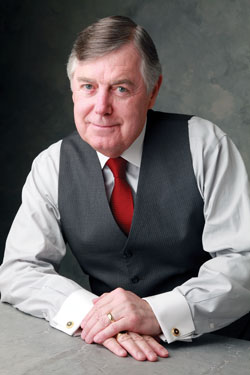Upward and Onward in 2012: Achieve New Heights in Promoting Rule of Law

Photo by Marc Hauser
As the new year approaches, tradition suggests that we thoughtfully examine the past year and set goals for the next. As lawyers, we should go beyond losing weight and saving more for retirement. Our New Year’s resolutions should help in our commitment to the rule of law and access to justice. For 2012, let’s roll up our sleeves and resolve to:
• Stand up and speak out for more adequate funding for courts. Our state courts are in financial crisis. Each day in this country, judges and court employees are asked to do more with less because of continuing budget cuts. The lack of funding has led to court closures, furloughed or laid-off employees and extended judicial vacancies. These cuts limit access to justice and ultimately threaten to undermine every American’s right to due process. Justice delayed is justice denied.
At a court funding symposium in September—hosted by the Kentucky Law Journal and the University of Kentucky College of Law, and co-sponsored by the ABA, the National Center for State Courts and LexisNexis—chief justices, legal scholars, bar leaders and the business community joined together for a national dialogue on the negative impact of court underfunding. We agreed that courts must continue to function at a high level in this time of scarce budget resources. We also agreed to spread the word to the public and to those who disburse the funds. The judiciary is the co-equal branch of government responsible for protecting constitutional rights of citizens and deciding matters that affect our daily lives. Without our courts, there is no justice and no freedom.
• Volunteer our time through pro bono representation and volunteer service. Adequately funded and open courts are only part of the access-to-justice issue. Low-income Americans deserve high-quality representation to fulfill the constitutional right of equal justice for all. Such representation is a testament to the hard work of lawyers who help more than 2 million people every year through legal aid. But the Legal Services Corp., the nation’s largest legal aid provider, and similar groups must turn away about half of those who seek assistance. There are even more who never find their way to a legal aid or pro bono attorney. Pro bono work helps fill that void. It is a serious professional responsibility, helps guarantee the legitimacy of our legal system and, in turn, makes us better lawyers.
In October, the ABA held its annual Celebrate Pro Bono week, with more than 600 free clinics and other events all around the country. The ABA’s Standing Committee on Pro Bono and Public Service is hosting an online national conversation for a new vision of free legal services delivery. I invite you to join this exchange of insight and ideas at celebrateprobono.wordpress.com. Each year we should rededicate ourselves to expanding pro bono work as we train more lawyers to do good and serve clients in need.
• Promote diversity in our profession. Equal access is a continuing challenge for women and diverse lawyers. We know that women make up 50 percent of the U.S. population, but only 33 percent of lawyers and only 15 percent of equity partners. Racial and ethnic minorities also are underrepresented. The legal profession must continue to recruit, hire and promote a diverse demographic of people—not just based on color or gender, but also on disability status, sexual orientation, background and experience. And we must measure success beyond the numbers. We need to create a constructive culture where diverse views can be voiced and are respected, where mentoring programs are encouraged and where scholarship is promoted.
This past April I attended the joint spring meeting of the ABA Center on Racial and Ethnic Diversity, which featured many projects that promote diversity in the legal profession and the justice system. With the new year approaching, we in the ABA should resolve to strengthen our own individual efforts and collaborate with others to advance fair access to justice and opportunity for all.
In conclusion, I encourage each of us in the coming year to act with civility, and to show in every aspect of our personal and professional activities a genuine gratitude for family, friends and the constitutional freedom our great country affords us. In making such New Year’s resolutions a reality in 2012, we in the ABA will come much closer to achieving professional success at its best.
Upward and onward in 2012!
Wm. T. (Bill) Robinson III, Frost Brown Todd LLC, is a civil litigator and member-in-charge of FBT’s office in Florence, Ky., and also has an office with FBT in Cincinnati.



